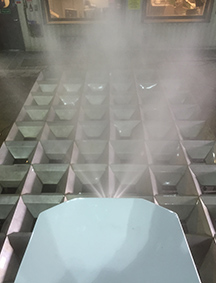by Brianna Crandall — November 14, 2016 — Surefire’s UltraGuard is the first portable watermist unit to achieve third-party certification to LPS 1655, BRE Global’s dedicated fire performance standard for personal protection systems (PPS), according to news from U.K.-based building sciences group BRE. A PPS is a domestic fire suppression system designed to protect a specific risk, typically vulnerable people who are at greater risk from a fire in a residential setting.
UltraGuard portable watermist system
Designed to protect the vulnerable, the UltraGuard portable watermist PPS detects and suppresses fire at an early stage, which prevents the spread of fire and smoke-related fire deaths. A powerful fire protection system now being used as effective assisted-living technology, UltraGuard has saved around 10 lives every year since its development in 2010.

Surefire’s UltraGuard portable watermist unit was subjected to two fire-test scenarios — one in close proximity and the other with shielded fire development.
Fast and efficient, UltraGuard is totally self-contained and simply plugged into the nearest outlet, making it ideal for flexible fire protection to enhance risk management on a temporary or more permanent basis. In a fire situation, UltraGuard can also create a corridor of mist to allow safe evacuation where a fixed system is not feasible, perhaps due to budgetary or architectural constraints.
LPS 1655 standard
In the absence of a dedicated BS or EN standard, LPS 1655 offers a robust, third-party approval standard to establish a credible performance level for PPS to engender specifier and user confidence.
Increasingly, fire services across the U.K. are issuing guidance and promoting awareness to highlight the greater fire risks faced by vulnerable people living at home, often alone. BRE Global itself has co-authored guidance with the London Fire Brigade (LFB) on identifying vulnerable people at risk and assessing when a PPS or other measures should be implemented.
BRE Global’s third-party approval for PPS now provides confidence for care service and housing providers responsible for the safeguarding of vulnerable people in various types of residential situations.
The LPS 1655 standard incorporates system design requirements, including minimum levels of performance and functionality, system manual and installer requirements, fire-test protocols, and maintenance arrangements. It also covers the examination and testing of components.
In addition, BRE inspectors carry out ongoing audits of the manufacturer’s quality management systems and production to assure units on the market conform to the design blueprint.
Products are subjected to two fire-test scenarios. The first is representative of fires that start in bedding or clothing, where a person may be in close proximity. The second replicates “shielded fire development,” and considers the potential for control of the fire and the prevention of fire spread beyond the items first ignited.
A PPS needs to detect and suppress a fire at a very early stage before significant heat and smoke has developed to cause serious injury, points out BRE Global. Notably, LPS 1655 requires system actuation by a fire detector (or detectors), as more traditional, thermally activated devices may be too slow, especially for smoldering fires in clothing or bedding.
BRE Global-certified products, including watermist systems, are listed in the globally recognized Red Book used by buyers worldwide to source trustworthy, third-party-approved fire and security products.




